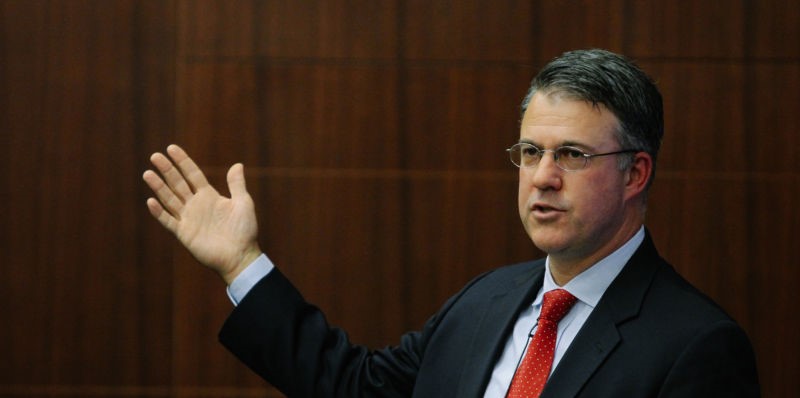Democracy under (cyber) attack
March 24, 2018 | Expert Insights

At a hearing on Russian interference in the 2016 US elections, Eric Rosenbach explained how democracies might be particularly vulnerable to cyber attacks and misinformation campaigns. Rosenbach detailed a number of steps to address vulnerability to digital warfare. His suggestions included disseminating accurate information, regulating data privacy, and monitoring content on social media.
Background
Cyber-attacks are a growing security threat for nations across the world. Last year, in the “WannaCry”virus attack - that the United States and others have attributed to North Korea - 200,000 individual users across 150 countries had their information held at ransom by malware. In February this year, the United Kingdom and the United States formally identified Russia as the propagator of the NotPetya cyber-attacks of 2017. The attacks were directed at Ukraine, with whom Russia has a territorial dispute. The NotPetya attacks affected corporations across the world and led to a loss of approximately $1.2 billion.
Social media too, has become increasingly weaponised. Social media has been held responsible for the spread of hate and terrorist propaganda, the use of bots, misinformation and influence campaigns, and the proliferation of fake news. Corporations such as Google, Apple, Facebook, and Amazon, hold enormous amounts of personal user data and have high potential for exploitation. This is evident in the recent Cambridge Analytica scandal, where the political consulting company was accused of a Facebook data breach. The company allegedly acquired the private data of 50 million users, which may have been used in influence campaigns.
According to US intelligence agencies, the Kremlin interfered in the 2016 US presidential elections. Russia is said to have hacked the servers of the Democratic National Committee (DNC) and the personal email account of John Podesta, chairman of Hillary Clinton’s campaign. The data obtained from these hacks was allegedly forwarded to Wikileaks. According to a report released by the US intelligence community in January 2017, this hack served to “undermine public faith in the U.S. democratic process, denigrate Secretary Clinton, and harm her electability and potential presidency.”
Analysis
In the light of burgeoning cyber threats, governments across the world have begun to address digital vulnerabilities. In a United States Senate hearing on Russian Interference in the 2016 US Elections, Eric Rosenbach explained how these attacks threaten the very basis of democratic institutions across the world. Rosenbach is Co-Director of the Belfer Center for Science and International Affairs at the Harvard Kennedy School; former Chief of Staff to the Secretary of Defence, and Assistant Secretary of Defense for Homeland Defense and Global Security.
Rosenbach argued that digital warfare has become a defining threat to national security. He cited Russian “attempts to undermine the strength of American democracy” through election interference, as well as cyber-attacks against the US energy grid, and called for action.
Democracies are particularly vulnerable to digital threats, Rosenbach stated, comparing an “open and transparent information ecosystem” to a “glass house”. The first reason for this vulnerability is that Cyber-attacks are asymmetric. A small nation such as North Korea can easily amass greater “offensive cyber capabilities” than larger states with greater military power.
Additionally, greater connectivity, free speech, and access to information increase a country’s susceptibility to such attacks. Writing for the Belfer Center, Rosenbach elaborated: “In contrast, authoritarian societies often control the media, censor the internet and shield their nations from outside information through national firewalls, such as the Great Firewall of China.”The vulnerability of an open society is further multiplied through social media and information sharing capabilities.
Rosenbach noted that cyberattacks have increasingly been used to undermine people’s faith in the democratic process. Interference in the electoral system hinders citizens’ trust in the government. In order to counter attempts to devalue democracy, Rosenbach suggested a “whole-of-nation effort” by four key actors: State governments, political campaigns, social media companies, and central governments.
Rosenbach outlined a number of solutions. He noted that social media sites such as Facebook and Twitter “do not just house public discourse; they shape it”. As a result, these sites must be held accountable to their actions. He suggested social media sites reduce automated decisions, particularly to do with content and account monitoring. Human judgement is imperative to address issues such as misinformation and the use of bots. Private data should also be protected through legislation.
Rosenbach emphasised the importance of transparency. Social media companies can help check influence campaigns by informing users about politically funded advertisements. Governments must communicate clearly with the public, particularly on issues surrounding electoral processes. Accurate information is the most effective counter to the misinformation strategies used by malevolent forces. Rosenbach stressed the importance of honest and straightforward government communication.
Finally, both local and central governments must bolster digital security. In addition to this, creating a centralised knowledge base and implementing cyber-security training at numerous levels of government will help address security concerns.
Assessment
Our assessment is that cyber attacks are a new form of asymmetric warfare. While Rosenbach discussed cyber-security threats in an American context, his suggestions are relevant to democracies across the globe. The digital world is being weaponised. We believe that cyber-attacks must be treated as tangible threats to national security and addressed through national security policy. After a recent round-table conference hosted by the Synergia Foundation, we expressed our belief that knowledge sharing and joint training with allies might help strengthen national defences against digital warfare.








Comments